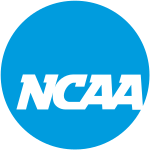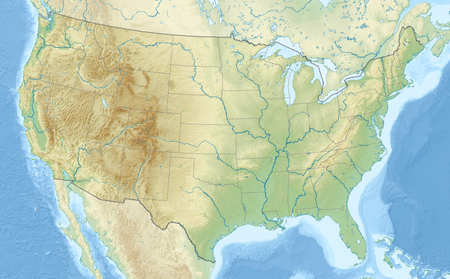NCAA Division II football championship
| Current season, competition or edition: | |
 | |
| Sport | American football |
|---|---|
| Founded | 1973 |
| First season | 1973 |
| No. of teams | 28 |
| Country | United States |
| Most recent champion(s) | Ferris State (2024) |
| Most titles | Northwest Missouri State (6 titles) |
| TV partner(s) | ESPN2 |
| Level on pyramid | 2 |
| Related competitions | Division III |
| Official website | ncaa.com/football/d2 |
The NCAA Division II football championship is an American college football tournament played annually to determine a champion at the NCAA Division II level. It was first held in 1973, as a single-elimination playoff with eight teams. The tournament field has subsequently been expanded three times: to 16 teams in 1988, 24 teams in 2004, and 28 teams in 2016.
The national championship game has been held in eight different cities. Former sites include Sacramento, California (1973–1975); Wichita Falls, Texas (1976–1977); Longview, Texas (1978); Albuquerque, New Mexico (1979–1980); McAllen, Texas (1981–1985); Florence, Alabama (1986–2013); and Kansas City, Kansas (2014–2017).[1] From 1973 through 1985 (with the exception of 1978) the championship game carried a bowl designation (see NCAA Division II bowl games).
Since 2018, the championship game has been played at the McKinney ISD Stadium and Community Event Center in McKinney, Texas.[2] Since 1994, the games have been broadcast on ESPN.
Small-college wire service national champions
[edit]Prior to 1973, for what was then called the NCAA College Division, national champions were selected by polls conducted at the end of each regular season by two major wire services, the Associated Press (AP) and United Press International (UPI). In some years, the two polls named different number one teams. From 1964 to 1972, postseason bowl games crowned four regional champions. NCAA Division II bowl games still exist, but only as postseason contests for teams not qualifying for the championship playoffs.
Polls to rank "small college" football teams were conducted by the Associated Press (AP) and United Press International (UPI) during, and at the end of, each regular season. The AP polled a panel of writers, while UPI polled a panel of coaches. When UPI began its poll in 1958, it explained that the poll would cover college football programs not considered "major" by the Football Writers Association of America (FWAA), with the small schools (then numbering 519) belonging to the NCAA, the NAIA, both, or neither.[3] The AP began its poll in 1960.[4]
National champions per wire service polls
[edit]
| Year | Top-ranked team | |
|---|---|---|
| per UPI poll | per AP poll | |
| 1958 | Mississippi Southern | (no poll) |
| 1959 | Bowling Green | (no poll) |
| 1960 | Ohio | |
| 1961 | Pittsburg State | |
| 1962 | Southern Miss | Florida A&M |
| 1963 | Delaware | Northern Illinois |
| 1964 | Cal State Los Angeles | Wittenberg |
| 1965 | North Dakota State | |
| 1966 | San Diego State | |
| 1967 | San Diego State | |
| 1968 | San Diego State | North Dakota State |
| 1969 | North Dakota State | |
| 1970 | Arkansas State | |
| 1971 | Delaware | |
| 1972 | Delaware | |
| 1973 [n 1] | Tennessee State | |
| 1974 [n 1] | Louisiana Tech | Central Michigan |
- Notes
NCAA Division II champions
[edit]Since 1973, a post-season tournament has been held to determine the Division II Champion. The current format, in use since 2016, features 28 teams. They are organized into 4 super-regions of 7 teams each, with the top-seeded team in each super-region getting a bye during the first round. Prior to the championship game, all contests are hosted by the higher-seeded team. the semi-final games are held at the home stadiums of the two highest-seeded remaining teams. Since 2018, the championship game has been played at the McKinney Independent School District Stadium, a 12,000 seat facility that opened in August 2018.
Results
[edit]- Key
- aet – game went to extra time
- Notes
Team titles
[edit]
|
|
 Northwest Missouri State North Dakota State Grand Valley State Valdosta State North Alabama Texas State Troy Pittsburg State Northern Colorado Minnesota–Duluth Ferris State Louisiana Tech Central Michigan Northern Michigan Montana State Lehigh Eastern Illinois Delaware Cal Poly Jacksonville State Delta State North Dakota West Florida Texas A&M– Commerce CSU– Pueblo Harding
|
Championship game appearances
[edit]Programs that no longer compete in Division II are indicated in italics.
| Team | App. | Years |
|---|---|---|
| Northwest Missouri State | 10 | 1998, 1999, 2005, 2006, 2007, 2008, 2009, 2013, 2015, 2016 |
| North Dakota State | 7 | 1981, 1983, 1984, 1985, 1986, 1988, 1990 |
| Valdosta State | 7 | 2002, 2004, 2007, 2012, 2018, 2021, 2024 |
| Grand Valley State | 6 | 2001, 2002, 2003, 2005, 2006, 2009 |
| North Alabama | 5 | 1985, 1993, 1994, 1995, 2016 |
| Pittsburg State | 5 | 1991, 1992, 1995, 2004, 2011 |
| Ferris State | 4 | 2018, 2021, 2022, 2024 |
| Jacksonville State | 4 | 1977, 1989, 1991, 1992 |
| Carson–Newman | 3 | 1996, 1998, 1999 |
| Delaware | 3 | 1974, 1978, 1979 |
| Colorado Mines | 2 | 2022, 2023 |
| Delta State | 2 | 2000, 2010 |
| Eastern Illinois | 2 | 1978, 1980 |
| Indiana (PA) | 2 | 1990, 1993 |
| Minnesota–Duluth | 2 | 2008, 2010 |
| Minnesota State | 2 | 2014, 2019 |
| North Dakota | 2 | 2001, 2003 |
| Northern Colorado | 2 | 1996, 1997 |
| Portland State | 2 | 1987, 1988 |
| Texas State[a] | 2 | 1981, 1982 |
| Troy[b] | 2 | 1984, 1987 |
| Western Kentucky | 2 | 1973, 1975 |
| West Florida | 2 | 2017, 2019 |
| Akron | 1 | 1976 |
| Bloomsburg | 1 | 2000 |
| Cal Poly | 1 | 1980 |
| Central Michigan | 1 | 1974 |
| Central State | 1 | 1983 |
| CSU–Pueblo | 1 | 2014 |
| Harding | 1 | 2023 |
| Lehigh | 1 | 1977 |
| Lenoir–Rhyne | 1 | 2013 |
| Louisiana Tech | 1 | 1973 |
| Montana State | 1 | 1976 |
| New Haven | 1 | 1997 |
| Northern Michigan | 1 | 1975 |
| Shepherd | 1 | 2015 |
| South Dakota | 1 | 1986 |
| Texas A&M–Commerce | 1 | 2017 |
| Texas A&M–Kingsville | 1 | 1994 |
| UC Davis | 1 | 1982 |
| Wayne State (MI) | 1 | 2011 |
| Winston-Salem State | 1 | 2012 |
| Youngstown State | 1 | 1979 |
| Mississippi College | 0 |
Of the programs that no longer compete in D-II, Akron, Central Michigan, Jacksonville State, Louisiana Tech, Texas State, Troy and Western Kentucky currently compete in Division I FBS. All others compete in Division I FCS.
Notes
[edit]† Mississippi College's 1989 tournament participation, along with its championship, were vacated by the NCAA Committee on Infractions.
- a During Texas State's entire tenure in Division II, its name was Southwest Texas State University. The school adopted its current name in 2003.
- b During Troy's entire tenure in Division II, its name was Troy State University. The school adopted its current name in 2005.
Teams that moved to Division I
[edit]Most of the participants in early national championship games have moved into Division I, the main catalyst for their moves being the creation of Division I-AA, now the Division I Football Championship Subdivision (FCS), in 1978. The following Division II title game participants later moved to Division I:
|
|
Postseason bowls
[edit]Regional bowls
[edit]From 1964 to 1972, four regional bowl games were played in order to provide postseason action,[6] however these games took place after the AP and UPI polls were completed, therefore these games did not factor in selecting a national champion for the College Division. The bowl games were:
| Region | 1964 | 1965 | 1966 | 1967 | 1968 | 1969 | 1970 | 1971 | 1972 |
|---|---|---|---|---|---|---|---|---|---|
| East | Tangerine Bowl | Boardwalk Bowl | |||||||
| Orlando, Florida | Atlantic City, New Jersey | ||||||||
| Mideast | Grantland Rice Bowl | ||||||||
| Murfreesboro, Tennessee | Baton Rouge, Louisiana | ||||||||
| Midwest | Pecan Bowl | Pioneer Bowl | |||||||
| Abilene, Texas | Arlington, Texas | Wichita Falls, Texas | |||||||
| West | Camellia Bowl | ||||||||
| Sacramento, California | |||||||||
Winners of regional bowls
Playoff bowls
[edit]From 1973 to 1977, some of the tournament games were also known by bowl names;
- In 1973, one of the first-round games was the final playing of the Boardwalk Bowl.
- From 1973 through 1975, the two semifinal games were the Grantland Rice Bowl and the Pioneer Bowl, while the final game was the Camellia Bowl.
- In 1976 and 1977, the two semifinal games were the Grantland Rice Bowl and the Knute Rockne Bowl, while the final game was the Pioneer Bowl.
See also
[edit]- List of NCAA Division II football programs
- List of NCAA Division II Football Championship appearances by team
- NCAA Division II bowl games
- College Football Playoff (FBS)
- NCAA Division I Football Championship (FCS)
- NCAA Division III Football Championship
- NAIA Football Championship
References
[edit]- ^ "Kansas City to host 14 NCAA championships". Sporting Kansas City. December 11, 2013.
- ^ "NCAA seeks new D2 football title game host because Sporting KC will renovate field". KansasCity.com. Kansas City Star. September 4, 2018. Retrieved September 6, 2018.
- ^ "Small College Football Board Named by UPI". Brownwood Bulletin. Brownwood, Texas. UPI. September 18, 1958. p. 3. Retrieved May 6, 2024 – via newspapers.com.
- ^ "Ohio U. Leads Small College Grid Poll; Muskingum Gains Ranking". The Daily Reporter. Associated Press. October 6, 1960. p. 18.
- ^ "Cal Poly-SLO, Martin wreck Eastern Illinois". The Pantagraph. Bloomington, Illinois. AP. December 14, 1980. Retrieved February 26, 2017 – via newspapers.com.
- ^ a b c "Division II All-Time Championship Results Bracket" (PDF). NCAA. NCAA.org. p. 2. Retrieved March 3, 2014.
- ^ "North Alabama vs. Northwest Missouri State - Game Summary". ESPN. December 18, 2016.

